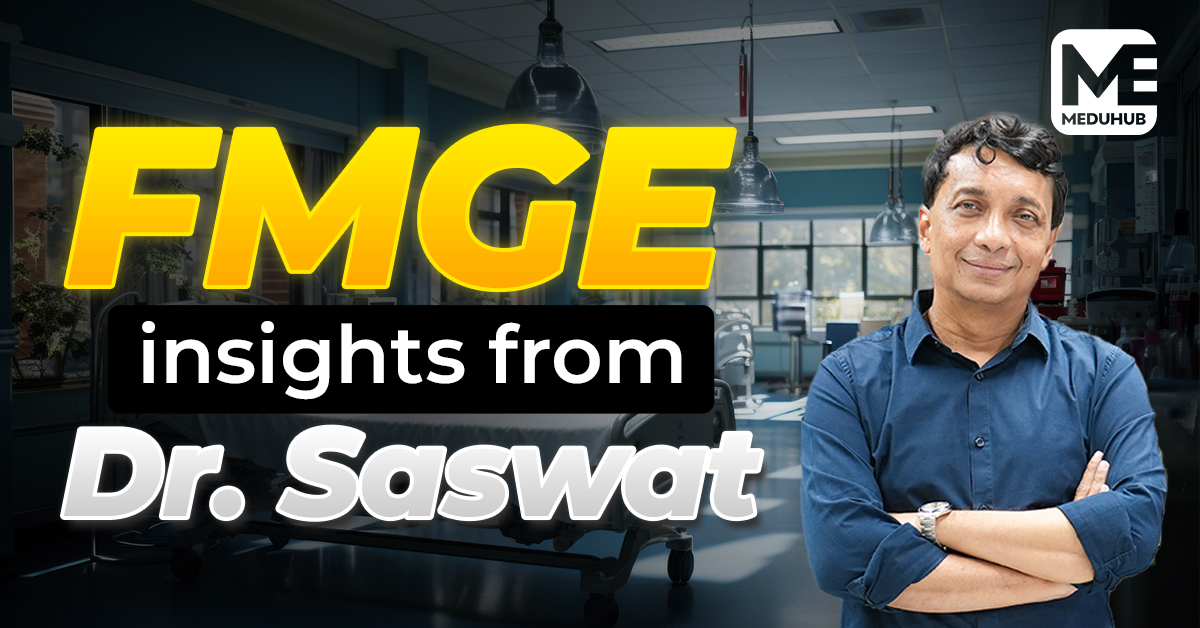
FMGE insights with Dr. Saswat Ray
MeduHub recently hosted Dr. Saswat Ray- Senior FMGE Faculty, Ophthalmology; for an interview in which he discussed tips to succeed in the FMGE exam. In this exclusive Q&A session, we delve deeper into FMGE's effective preparation strategies and last-minute tips & tricks to crack the Foreign Medical Graduate Examination (FMGE) with Dr. Saswat Ray.
Whether you are going to appear for FMGE in 2024, or you are planning to start the preparation, this short discussion is for you. Besides, this interview also has some valuable tips for students pursuing their MBBS abroad and will be appearing for FMGE in the coming years.
Here we go!
Interviewer: Can you please share your experience of FMGE and the process around it?
Dr. Saswat: FMGs have this problem that for five to six years they haven’t been taught much according to the FMGE in their respective colleges. When the FMGs come to India for the exam, they are supposed to cram everything in six months. This is not possible. It’s not architecture or fashion designing, it’s medicine. Medicine requires preparation for six years, and if not six years, then at least two to three years. These medical students suffer from this handicap that they have to study six years of syllabus in just six months. It becomes impossible. There’s a tremendous amount of load on them which plays havoc with their lives and health. It’s unfortunate for such young people. I don’t see a way out until FMGs start preparing for the exam right from the first year. I suggest that students who are outside India pursuing their medical degree should start preparing from the first year. That’s the only way to crack the FMGE.
Interviewer: If you have to point out one mistake made by FMGE aspirants, what would you say?
Dr. Saswat: Starting too late. In the case of Medicine, the preparation has to start from day one. If you start from the fifth year, it’s too late. The students who are pursuing their medical degree from abroad should always remember that with great liberty comes great responsibility. While you are free to enjoy, you should also start studying early.
Interviewer: If we pick up your subject, Ophthalmology, what would be some key suggestions that you would like to share with the students?
Dr. Saswat: There’s this saying which goes like this, “When the student is ready, the master will appear.” In Ophthalmology and any other subject, the most important thing is the basics. Read anatomy, physiology, and biochemistry. You cannot make a building without bricks. The bricks of all medicine are anatomy, physiology, and biochemistry. After the basics, study pathology, pharmacology, and microbiology. You will be ready after studying these, and once you are ready, the master will arrive.
Interviewer: What would you say to the students to help them stay motivated and maintain their momentum throughout the preparation journey?
Dr. Saswat: It’s impossible to stay motivated throughout because medicine is a deep subject. While studying medicine, you cannot take anything for granted. Think of yourself as a doctor to keep yourself motivated. You need to realize the fact that you are going to be a doctor. Your profession is going to be special, and different. Walk on the ground but think of yourself as slightly above the ground. As doctors you are slightly above the ground because you carry the touch of God.
Interviewer: Talking about the preparation journey or the preparation strategy, how important do you think mock tests are in the entire preparation journey?
Dr. Saswat: I undoubtedly agree that mock tests are very important. In mock tests or any type of test, you are answering MCQs. Let’s remember that mock tests are very different from your knowledge. There are multiple ways of asking questions on a certain subject. There are facts and the examiners weave stories around them. Mock tests are important and it’s not enough to just study the subject. You should do as many mock tests as possible and answer as many MCQs as possible. It will test your knowledge. If you have not got the mindset to face MCQs, it will be very difficult to do them when you see them for the first time in the exam.
Interviewer: Do you have any last-minute tips for FMGE aspirants who are about to sit for the exam?
Dr. Saswat: There’s only one mantra. Revision, revision, revision! You have to revise again and again. The human memory is built on reinforcement. None of us can remember facts. I myself cannot remember facts. Writing is important to remember. Write, sketch, and draw, to remember facts. None of us can memorize facts like that. Revise not once, twice, or thrice. Revise four times. Do it for yourself, do it for your parents, do it for me, do it for your friends. Revise many times. The only thing you can depend upon is revision. You cannot forget it in the exam, and you can only remember it when you revise.
Students who are pursuing their MBBS abroad should start preparing early for FMGE. The best way to crack FMGE is to prepare for FMGE from the first year of the MBBS program. Students should focus on keeping their basics strong so they should study anatomy, physiology, and biochemistry well.
Thinking like a doctor and knowing that doctors have a special place and respect in society helps you keep motivated through the preparation phase. Solve lots of MCQs while preparing for FMGE to test your knowledge and develop an exam attitude. Revision is the key to success in FMGE. Revision helps you remember the facts and prepares you to face FMGE with confidence.